Training the Head, Heart, and Hands: Student Mentorship in the Church and the Classroom
Chad Burchett | March 02, 2023
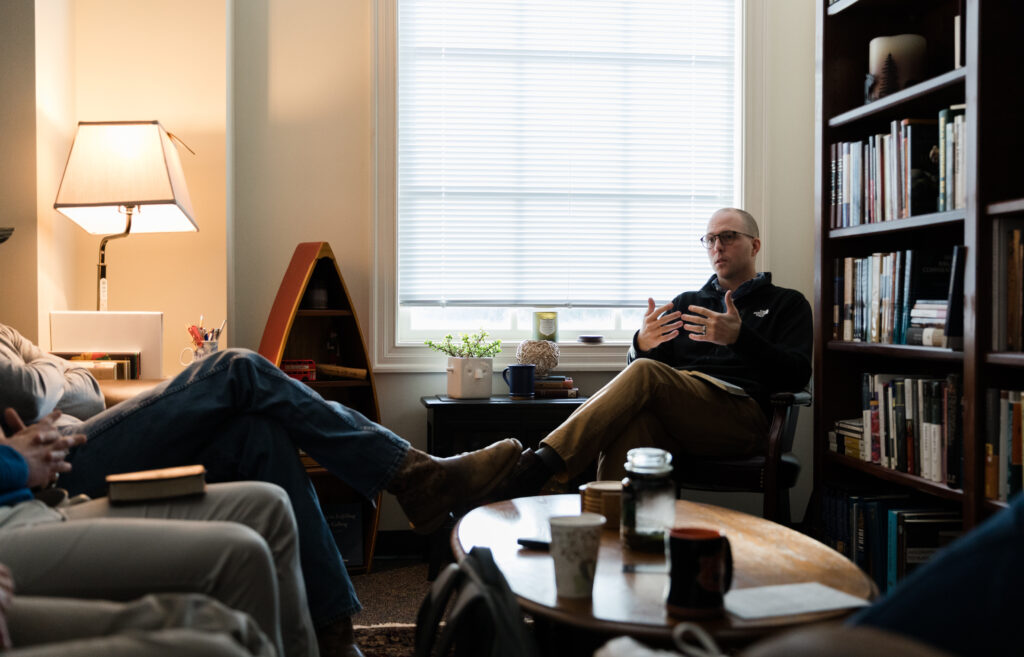
For Benjamin Quinn, professor of theology and history of ideas at Southeastern, seminary is a strategic place of holistic spiritual formation. The seminary curriculum, classroom, and community provide students daily rhythms and a familiar space to learn and mature. When stewarded well, seminary helps students habituate theologically robust practices of holiness, worship, and mission for service in the local church. That is why Quinn is committed to teaching and mentoring his students not only as a professor but also as a local church pastor.
Quinn’s approach to theological education as holistic spiritual formation took shape years earlier when he first came to Southeastern in 2005 as an MDiv student.
Motivated to learn how Christian theology could speak to everyday moral issues, Quinn was drawn to Southeastern’s ministry-based program in Christian ethics, so he and his wife Ashley decided to visit campus. When they arrived and talked with faculty, they knew Southeastern was where Quinn needed to be formed.
“Not only did it feel like home, but also we could sense its focus on balancing the head and the heart and the hands of life and ministry,” recalled Quinn. “I knew I needed my seminary training to sink deep into my heart and to be applicable with my hands and feet for life and ministry. Southeastern was clearly a place for that.”
I knew I needed my seminary training to sink deep into my heart and to be applicable with my hands and feet for life and ministry. Southeastern was clearly a place for that.
As a student, Quinn learned the value of community for spiritual formation through intentional friendships with professors and coworkers. Their openness to his questions helped him more faithfully interpret and apply the Scriptures, navigate his roles as a husband and father, and minister in the local church.
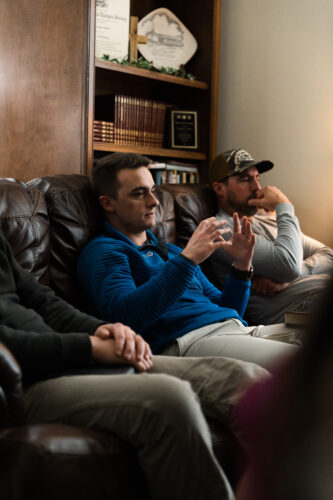
After graduating with his MDiv in 2008, Quinn continued with a ThM in ethics, later graduating in 2010. During that time, Quinn taught and served in various ministries at a small country church in Youngsville, North Carolina, Holly Grove Baptist Church.
“My wife and I didn’t believe in just sitting on our hands in seminary,” commented Quinn. “The thought of just attending a church for a couple years while in seminary never crossed my mind. In fact, that would have been so stifling because I needed a laboratory to exercise what God was working in me and to practice the things I was learning.”
Quinn served there four years before transitioning to another church in the area during his doctoral studies through Trinity College, Bristol. In God’s providence, Quinn joined Southeastern’s faculty in 2012, bringing with him a passion for student formation and classroom discipleship. Drawing on formative lessons from his pastors and professors, Quinn sought to shape students in the classroom the way others had encouraged, challenged, and discipled him.
For the first few years, Quinn’s vision for teaching and for student mentoring was often confined to the classroom. However, in the fall of 2017 that vision began to expand and shift when Quinn was asked to return to Holly Grove as an interim pastor and then became lead pastor there a few months later.
“When we got back involved in vocational church ministry at Holly Grove, the Lord impressed on me the importance of letting the context of the local church inform and shape the way I teach, answer student questions, and think about discipleship with my students,” shared Quinn. “Pastoring a local church helps me think about how their formation in the classroom serves their formation and ministry in the local church. It changes the way I answer my students when they ask how a class topic relates to ministry. I used to theorize; now I share what we’re trying to do at our church, what’s working or not working, and what I am doing to communicate these truths to my church family.”
The Lord impressed on me the importance of letting the context of the local church inform and shape the way I teach, answer student questions, and think about discipleship with my students.
Quinn’s return to vocational church ministry not only changed his classroom pedagogy but also opened a new context in which to mentor students. Pastoring a church just 30 minutes from Southeastern’s campus, Quinn has been both professor and pastor to many Southeastern students — several of whom serve in church leadership at Holly Grove.
Graduate students at Southeastern, Ian Power and Ryan Renfrow serve on Holly Grove’s leadership team and are being mentored by Quinn in their overlapping contexts. For Quinn, living in dual communities — both church and seminary — with these guys has maximized opportunities for him to intentionally disciple, counsel, and shepherd them. The proximity leads to deeper spiritual formation.

“It is ideal to have the seminary and church spheres overlapping because it enables theory and practice to come together,” noted Quinn. “It allows me to mentor, evaluate, and sharpen these guys on both sides. I am able to walk alongside these guys not only in their learning at seminary but also in their ministry application within our local church.”
“There’s a familiarity that comes with living in dual communities with these guys,” observed Quinn. “There is a connectivity that comes with that because they know I’m in the same spaces as they are when they’re in class or at work or at church. Our communities overlap. The professors who are teaching their other classes are my colleagues, and I know the biblical input and counsel they are receiving in this community as others help to form and train them.”
Southeastern’s proximity to dozens of healthy churches in the area offers students like Ian and Ryan the opportunity to be formed not only in the classroom but also in the church. Like Quinn, many of Southeastern’s professors are local pastors or are actively involved in the ministries of churches in the area. This proximity has enabled Quinn to meet regularly with these guys and invest holistically in their lives.
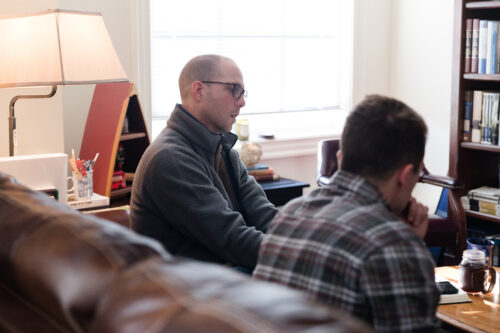
Gathering with Quinn on Tuesday mornings for a time of intentional discipleship, Ian and Ryan get to walk through seminary and ministry together, personally counseled and mentored by Quinn. For these guys, their studies and their ministries are closely bound together by a community of discipleship that is deeply rooted in the local church.
Quinn’s willingness to steward this dual community of church and seminary has deepened his investment in their lives, creating a culture where accountability, spiritual formation, and sharpening friendships truly flourish.
“Dr. Quinn was my pastor before I ever had a class with him, but he has intentionally pastored me through life and mentored me through academics, showing me how those two spheres of life dove-tail together,” shared Ian.
He has intentionally pastored me through life and mentored me through academics, showing me how those two spheres of life dove-tail together.
“Since I first met him, Dr. Quinn has become my pastor, a trustworthy mentor, and a dear friend,” commented Ryan. “Some of my most-cherished moments have been in Dr. Quinn’s office on Tuesday mornings when our Holly Grove leadership team gathers for prayer. We make coffee, pray for our church and for one another, laugh together, and truly enjoy each other’s company.”
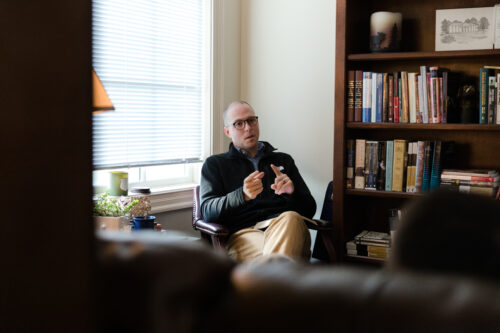
These Tuesday meetings have not only been formative for Ian and Ryan but also for Quinn, who is regularly challenged to more intentionally steward his classroom in service of the local church.
“I believe seminary exists for the purpose of equipping those who are preparing for ministry and mission — to equip them for life and service in the local church,” noted Quinn. “My time with these guys regularly reminds me of that. If I am not teaching and mentoring in such a way that the guys who sit in my office every Tuesday can take that back to their children’s ministry, youth ministry, or worship ministry, then I have not truly helped them. I have not finished my job.”
Quinn’s desire to disciple interns and leaders in his church is not aimed at keeping them at Holly Grove indefinitely; instead, Quinn holds these relationships with an open hand before the Lord and seeks to steward his time with them to form and mature them for what God has in store in their lives. In this way, Quinn’s approach to mentorship is aimed at mobilization.
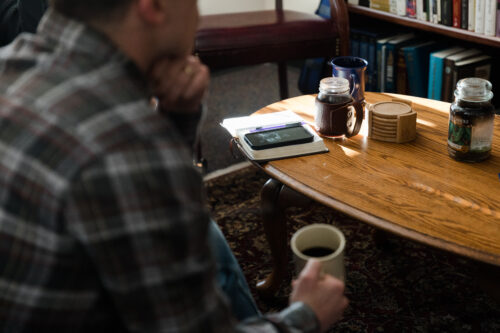 “Because we are near Southeastern, Holly Grove is very much an equipping church that seeks to come alongside students and supplement the training they are receiving at Southeastern as they prepare for ministry,” shared Quinn. “The people in our congregation have this DNA and are patient and well-suited to this approach. As students and interns join Holly Grove, our congregation is prepared to receive them, to be patient with them, to give them opportunities to invest in them, and then to celebrate when the Lord moves them elsewhere.”
“Because we are near Southeastern, Holly Grove is very much an equipping church that seeks to come alongside students and supplement the training they are receiving at Southeastern as they prepare for ministry,” shared Quinn. “The people in our congregation have this DNA and are patient and well-suited to this approach. As students and interns join Holly Grove, our congregation is prepared to receive them, to be patient with them, to give them opportunities to invest in them, and then to celebrate when the Lord moves them elsewhere.”
For Quinn, Holly Grove’s willingness to receive students is an expression of Great Commission-mindedness, which he traces back to the influence of Southeastern. Having been shaped in a Great Commission seminary culture, Quinn, Ian, and Ryan have learned to ask how the Great Commission shapes every aspect of life and ministry. That is what makes their intentional relationship so formative as they labor together in their dual communities to obey Jesus’s commission for the church: to make spiritually mature disciples of Jesus who go make disciples.